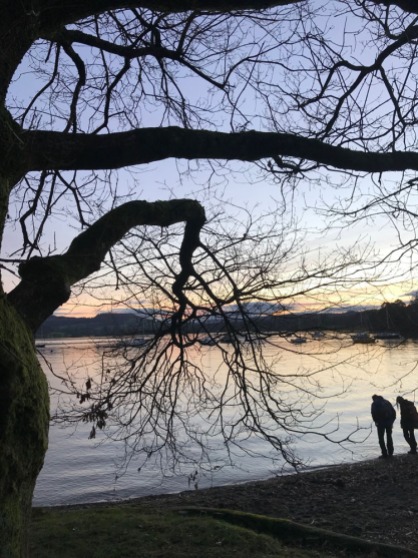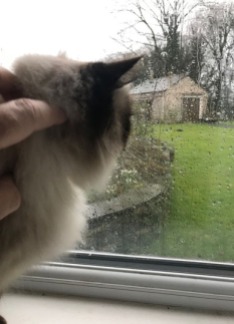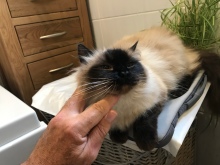
It’s a song by Blur and an iconic book by F. Scott Fitzgerald. The latter is autobiographical, and tells of the steady decline of his beloved wife, Zelda, as she descends into madness…
I don’t often write about dementia. But my mother’s own final years are proving to be a similar descent. She’s in a care home in Morecambe, on the seafront with beautiful views across to the Lake District where I can visit her with a short journey from Kendal… in normal times, that is…
The home is now in its third lockdown, following a mysterious and recurring outbreak on one of the upper floors; something that no-one, including the local health authority, seem to be able to get to the bottom of. People in care homes are subjected to far more screening that anyone else in the population, and yet they are the most mentally vulnerable.
The effects on the residents’ mental health have been devastating. My mother’s mental and physical wellbeing revolves around walks along the promenade into the centre of Morecambe. When Covid is not locking her up, she does this every morning, rain or shine. She’s nearly ninety-two and magnificent in her resolve to keep active; both mentally and physically. But the vascular dementia, diagnosed over fifteen years ago, is now approaching an advanced stage.
Because I have spent half my life teaching mysticism, I can see what is happening to her mind in a way that is easier to compartmentalise. From birth to the age of around seven years, we build our sense of ‘self’. Many people can remember the moment when they realised they had a self… and they stood on the edge of a changed and empowered world, full of a consolidated ‘me’ with all its hungers, fears and preferences.
This self strengthens until we mature into adults, then forms a stable layer of interaction with the world. All the ‘voluntary’ aspects of our nervous system are at its disposal. It’s truly captain of the ship, and has control of ‘the life’. It’s not the whole story, as mystical work reveals that there is a ‘higher self’ waiting to guide our lives… but that is for another post and speaks of a realm that requires the lower self to be fully functioning, too.
Part of that self-mechanism is responsible for checking itself. When we are young, we develop a tuned awareness of others’ opinion of what we do, achieve and when we disappoint. This is a conditioning that moulds our lives, and it’s central to how we feel about ourselves.
If mystical training is to be of use, this is the first thing that we need to learn to examine, checking that its values really represent the new and higher life we sense deep within us. Often they don’t; they were kindly imposed by a parental need for us to ‘fit in’ and have now become a prison. But the mechanism survives, albeit in diminished form.
The statistics tell us we are living longer, though given the levels of poverty one wonders why. On this basis, we will all face the slowing of memory and the mind’s logical workings. Are we able to equip our-selves to deal with this, not just for the care of others but also, in some small measure, for us? It’s a radical thought, and not one that psychology makes readily accessible.
Much of this is illustrated by some of my mother’s recent ‘behaviour’ – I hate that word, it makes you think she’s been ‘naughty’ in some way. It’s typical of how society shoves the elderly into a cupboard…
Typical dementia-related behaviour involves loss. Not just loss of memory, but loss of things – usually precious things, though the condition increases the sensitivity of the sufferer to the loss of anything. We’ll look at the reasons for this in a moment.
In Mum’s case, she has been losing things for years. When she was still independent, she would phone me in the middle of the night in a panic to say that ‘the thief’ had been in her house, again, and stolen her stoma supplies. She has a ‘bag’ following a near-death encounter with ulcerative colitis sixteen years ago. She rallied and has lived each day, fully, since then. But the importance of the stoma kit is deeply embedded, and often features in her panic.
Finding the stolen things was usually quite easy for me, my wife or my brother, but Mum’s mind was losing its ability to focus on problems. This is common with dementia, and shows how ‘problem solving’ is layered on top of ordinary thinking, and does not correspond with verbal logic, which usually remains high till near the end of life.
Following a fractured spine, when she fell out of bed while staying with us for a period of rest, we arranged, at her insistence, for her to go into a nearby home in Morecambe. It would take all her savings, but that was money well spent, and we weren’t worried about inheriting anything.
The first few months went well. She settled in, made a few good friends, and looked really healthy. Once Covid restrictions had lessened, the home was happy to let her walk along the prom each day, and she always came back, safely and on time. Her sense of direction – operating at a deeper level than the ability to find things, was (and is) intact.
But then the ‘thefts’ returned. And her fading mind told her that it was because none of the residents’ doors had locks… Item after item disappeared, until one day at the close of the latest partial lockdown, I was able to go in and find them hidden – by her – in her room; and action she had subsequently forgotten.
You could watch her mind working at that point – and what it was protecting was her self. She didn’t want to be ‘mad’. She wanted there to be a reason that she hadn’t been able to find the ‘stolen’ goods. The reason was that the thief was also sadistic and was putting the missing items into places where she wouldn’t be able to find them.
It’s part of the agony of having a loved parent with this condition that, no matter what you do, dementia will find a way of thwarting it. We discussed Mum’s fears with the home, who offered to install a lock in her door. For two weeks, she was gleefully happy, displaying the key on a string around her neck… until the thief returned, and something important went missing.
I walked with her along the seafront, and we discussed her new depression. She told me that she had worked out what was happening. There was a ‘skeleton key’ kept by the staff for safety, and the thief had somehow gained access to it… and continued to do so. At the time of writing, she is a depressed about this as before the introduction of the life-changing key. We are back where we started.
The sadness in watching each new thing we come up with fail is difficult to counter. Professional advice is simply to agree with them when they say something has been stolen. There is no way you can take them out of this perceived zone of peril and insecurity, because its the last thing protecting their sense of self…
When my time comes to face this decline – and I’m sure I will, given the genetics of both mother and grandfather, I want the night to be tender and for that night to know why I need to protect that most precious of possessions – my right to be the ‘me’ I’ve always known. I know that what I’ve been in this life – my personality – will die with the body. But the deeper Self will come to harvest the good of that lifetime, and learn the imbalance of the not so good. Then, we will move on, as the Cosmos constantly does… to new adventures, new learning, new development.
©Stephen Tanham 2021
Stephen Tanham is a Director of the Silent Eye, a journey through the forest of personality to the dawn of Being.
http://www.thesilenteye.co.uk and http://www.suningemini.blog




























Such a sad story, Steve… and one that is being enacted in our house too, albeit in the early stages. We are 77 and 75 and one of us is showing worrying signs. Heaven help us (and the family) if we both develop it…
LikeLiked by 1 person
Thank you, Jaye. I think we all have it, naturally, with ageing. It’s really a matter of degree. Keep your minds active with things you find HARD. That seems to be the key. Learning a new language, for example, or learning a branch of maths you were never good at… Puzzles and crosswords seem to help, as does the exercise of recalling, in detail, what happened during each day at the end of that day – play it backwards, rather than starting at the day’s beginning. Love to you both xx
LikeLiked by 1 person
Thank you, Steve… means a lot… 💕
LikeLike
Reblogged this on anitadawesauthor.com.
LikeLike
My Mum had dementia, though this wasn’t confirmed to me for several years. She and Dad lived with my sister and after he died in 1996, she stayed.
I was over 200 miles away but she came up for holidays when we were in the cottage. It was great to have her all to myself. In later years, things declined and I wrote to her rather than ring as she could not put a face to the voice and I could hear her distress. We wanted her to come and live with us, but she declined saying she was needed where she was. We asked several times, but didn’t push, as family and friends were there and it would not have been fair to uproot her.
Dementia affects everyone in the family, and from what I saw, it was heartbreaking to see Mum forgetful, repetitive and confused, but distance, travel and ill health made it impossible to visit on a regular basis. No-one seemed to appreciate that.
Mum passed away in January 2018 so I am glad that she was not caught up in Covid and all its upheaval. My thoughts are with you and your family Steve. Mums are so very precious and I am grateful I have so many wonderful memories.
LikeLiked by 1 person
Thank you, Di. Every such story is poignant, and it’s such a shared thing. All we can do is love and hold that vanishing hand … x
LikeLike
🙂
LikeLike
This is a difficult place to be Steve. My mother lost her sense of time and saw and spoke with people long dead while often not knowing who I was. I was just discussing with someone whether maybe she was just in a between place during those years and thus able to access both dimensions, rather than losing her mind as the diagnosis said. But it was very hard on all of us still tethered to this one, and also hard on her as well. (K)
LikeLike
Thank you, Kerfe it’s very difficult, but she still has her sense of humour…
LikeLike
Such a hard road to travel, Steve. But it sounds like your mum couldn’t be in better hands. Best wishes.
LikeLiked by 1 person
Thank you, Michael
LikeLike